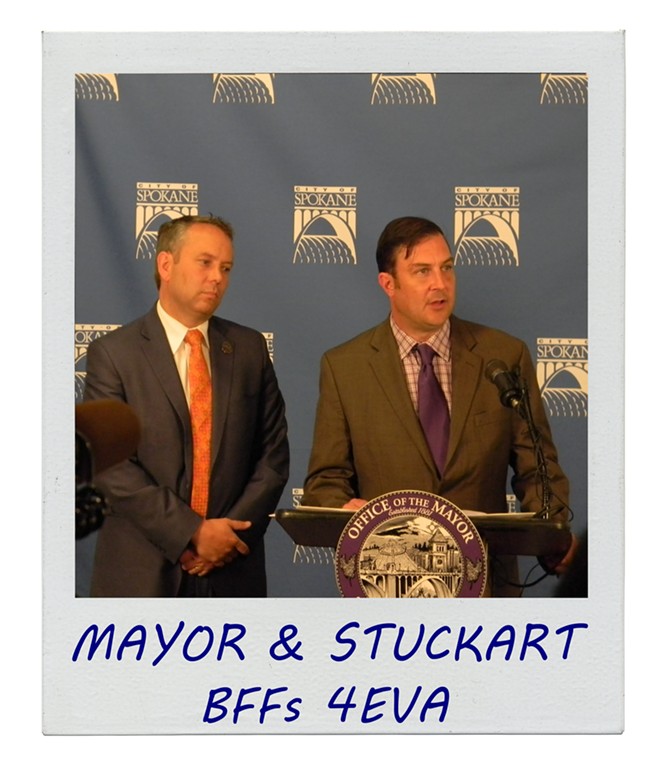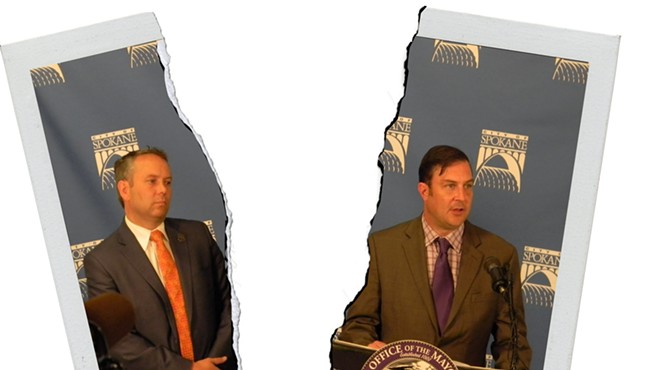Wednesday, September 28, 2016
Condon strikes deal, avoiding ethics commission hearing over alleged dishonesty

Daniel Walters photo
NOW member Sherry Jones explains why she decided to settle the organization's ethics complaint against the mayor, instead of grilling the mayor on his alleged dishonesty
For over nine months, a crucial question has been hanging before the city's ethics commission: Was Mayor David Condon honest or dishonest when he said "no," at a press conference a year ago, when the Inlander asked him if there had been any sexual harassment complaints "lodged" against former police Chief Frank Straub?
Two months after that clear denial, records revealed that former police spokeswoman Monique Cotton had personally complained to the mayor and City Administrator Theresa Sanders that Straub had grabbed her "ass" and tried to kiss her.
Since December, the ethics commission, Condon's attorney Jim King, and the National Organization for Women's attorney, Rick Eichstaedt, have been fighting over the minutia of that press conference to determine whether the mayor's comment violated the city's ethics code.
But just an hour and a half before the mayor
"This was a very difficult decision for us," Sherry Jones, with NOW, said at a press conference at noon. "Exacting a pound of the mayor's flesh was never our goal. We wanted accountability, yes, but more importantly, we wanted to make sure that sexual harassment complaints never again go uninvestigated."
While Condon had already committed to reform the city's equity and sexual harassment policies, the settlement guaranteed NOW would be able to have input in the process and set a deadline to have the process completed by the end of the year.
“The city is committed to protecting the well-being of our employees and ensuring they are treated fairly and appropriately, including addressing sexual discrimination and harassment,” Condon said in a press release. “This task force brings a tremendous mix of perspectives that will create a transformational organization to become the employer of choice.”
The settlement, however, did not include an admission of guilt from the mayor and did not include anything to specifically address NOW's concerns about the mayor's dishonesty.
"We wanted to hold Mayor Condon's feet to the fire on this issue, for sure," Jones says. "On the other hand, are we going to be able to guarantee he's always honest in the future or anyone is? No."
But focusing narrowly on the question of dishonesty, Jones says, wouldn't necessarily have pushed forward the ultimate goal of improving workplace safety and equality for female city employees.
"The struggle with dealing with the ethics commission is... so what? He gets a $75 fine? What really happens with the result of that?" Eichstaedt says, referencing the small fine the commission leveled against Sanders for being untruthful. "If we want to effectuate systemic change, that might not be the best outcome."
He also says the agreement also calls for the mayor to review the ethics commission process itself, a process which Eichstaedt says needs reform.
"It doesn’t have to be a process where you have to lawyer up to file a claim," Eichstaedt says. "If you’re somebody like the mayor and you're the subject of a frivolous claim, you also [shouldn't] have to lawyer up."
City Council President Ben Stuckart has previously floated the idea of Spokane, like Chicago, having an "inspector general" who would independently conduct investigations and assess ethics hearings.
By settling, however, it leaves the actual ethical question unanswered: Was the mayor honest or dishonest in his statement to the Inlander? I've combed through the documents filed by King and Eichstaedt, public records, and the massive report by independent investigator Kris Cappel to attempt to summarize the best cases for and against Condon.
The case for "honesty"
In his briefs, the mayor's attorney, Jim King, argues that the mayor wasn't unethical because his statement was true, that all the pieces of evidence" unmistakably show that Mayor Condon was honest the press conference."At that time, no one had filed an official, formal complaint with the city regarding sexual harassment, King says.
A second and a half after the mayor's denial, Condon was asked by KHQ reporter Patrick Erickson: "There have been rumors of an inappropriate relationship between the Chief and Ms. Dugaw. Has that been brought up at all? Was that any part of this as well?"
The mayor responded, "The critical thing is the management style. The issue with the — that you speak of ... there has been no official filings of anything."
King argues that Condon had no idea that "Ms. Dugaw" was a reference to Cotton's maiden name, and that the mayor's comment, in fact, was a clarification of his response to the Inlander, that the mayor was only referring to the lack of official filings, when he denied there had been any sexual harassment complaints.
And while King doesn't mention this, City Administrator Theresa Sanders' own notes detailing the conversation she had with Cotton over sexual harassment, quoted Cotton as saying she "cannot be party to a complaint regarding sexual harassment. This person has hurt me enough. I don't want to be hurt by him anymore."
If Sanders' quotes are accurate, it suggests that Cotton herself didn't believe she was making a complaint by bringing her allegations to the mayor and Sanders. She had pleaded with the mayor, Sanders, and city spokesman Brian Coddington to keep her complaint confidential.
For eight of the nine months that this ethics complaint had been argued, the debate focused on the definition of the phrase "complaint," with King preferring a very narrow definition and Eichstaedt preferring a much broader one.
But when the Yakima County Superior Court Judge Blaine Gibson dismissed the recall charges against Condon, he seized upon another word: "lodged."
He cited the Inlander's vibrant active verb choice as a reason for dismissing the charge. The verb "lodged," the judge argued, could imply something more formal than a casual complaint.
"The problem is one of semantics," Gibson said. "I think most people would understand the word 'lodged' to refer to something more formal than simply complaining."
Indeed, the Cambridge dictionary definition of "lodge" includes the definition "to formally make a complaint to an official." Gibson did not believe an issue of semantics met the very high bar required to initiate a recall in Washington state. So it's reasonable to think that it would not meet the standard for "dishonesty" before the ethics commission either.
The case for "dishonesty"
The Merriam-Webster definition of the verb "lodge" includes, "to lay (as a complaint) before a proper authority." You better believe that Cotton laid her complaint, about sexual harassment, before to the proper authorities. She met with the mayor himself in her lawyer Bob Dunn's office, and alluded to inappropriate touching by Straub.
She'd discussed her concerns about harassment in a phone call with City Administrator Theresa Sanders, Straub's immediate superior, where she said Straub had grabbed her "ass" and tried to kiss her. She told her she had the texts that could prove it. She alluded to the harassment again, in writing, in a text message. Her allegations were a major reason why she was moved out of the police department and into a position in the parks department.
And Cotton's allegations caused the city to conduct a "limited investigation" into the matter, Cappel found: The mayor and Sanders brought Cotton's allegations to city attorneys, who told Straub that Cotton had accused him of sexual harassment. Straub, according to Condon and Sanders, denied the allegations.
"He investigated, he disciplined, he moved Monique," Eichstaedt says of Condon. "It smelled, tasted, felt look exactly like a complaint."
Not only that, but you want formal? How about a letter, chock full of legal language to and from her lawyer to Condon and Sanders, intended to "formalize" a request for the mayor to approve a “minor contract claim” of $13,276.89.
"A promise was made for services rendered, my client relied on those promises, and then performed as requested," Dunn wrote.
And in this letter, Dunn threatened to file a formal legal claim — the first step to a lawsuit — that would accuse Straub of "predatory and sexually inappropriate misconduct and outrageous interactions, including physical and emotional assaults with and against subordinate female City employees" and of "causing and creating a work environment so sexually charged and hostile that it caused the constructive discharge of my client."
And while no legal claim was filed, the Inlander's question was about whether any complaint was lodged, not whether a formal legal claim had been filed. Arguably, a "minor contract claim" memorialized in a letter would count as an official filing.
Furthermore, the report that the mayor and city council commissioned from independent investigator Kris Cappel refers specifically to Monique Cotton's sexual harassment allegations as a "complaint" more than 35 times.
Even when Cappel found that the city had addressed Cotton's allegations effectively, she referred to it, unabashedly, as a complaint.
Ms. Cotton was reassigned to the Parks Division as a result of complaints she raised about Chief Straub in April 2015. Those complaints included allegations of sexual harassment and offensive and inappropriate treatment by Chief Straub during a meeting on March 31, 2015. Ms. Cotton’s complaints were shared with Mayor Condon in a private meeting at Ms. Cotton’s attorney’s office, and with Ms. Sanders in a series of in-person meetings, telephone calls, and text messages.In fact, Cappel titles a section of the report "What constitutes a 'complaint?" In it, she notes that the city code doesn't formally define "complaint." She notes that HR has investigated situations based only on complaints made orally.
While the SPD policy is somewhat ambiguous in that it refers to both “complaints” and “concerns,” the context and references throughout the policy indicate that an employee’s concerns or allegations need not be communicated formally (as in writing or using a specific form) to constitute a “complaint.”Ultimately, the question of honesty often comes down to intent. Did Condon believe that there actually had been any sexual harassment complaint lodged against Straub when he denied it to the Inlander?
But Eichstaedt points out that Condon acknowledges that Cotton's complaining would be a "complaint" in his interview with Cappel.
Q: Did you consider what she [Ms. Cotton] was telling you – and that is
that she was sexually harassed by Straub. Did you consider that she
was making a complaint?
A: In the sense I – yes. I turned that over to – to – to Theresa to – to
further take through the process, yeah.
Q: So you did – you did think that Monique was making a complaint? She
was complaining about something?
A: She was complaining about something, yes.
Not only that, he argues, Cotton's claim that she'd been inappropriately grabbed by Straub wasn't the only sexual harassment issue at play from Condon's perspective.
In Condon's interview with Cappel, he said that sexually graphic language Straub used in the explosive March 31 meeting with Cotton and several members of police leadership "was very uncomfortable for [Cotton] in a sexual harassment connotation."
According to witnesses, Straub yelled at Cotton that she'd "f—-ed him," made him "look like a f—-ing asshole" and told her she'd "f—-ed him in the ass and broke the d—- off."
And even though Cotton wasn't interviewed as part of the investigation over the March 31 incident, and even though she discussed the issue in the same meetings where she disclosed her sexual harassment, King himself has referred to Cotton's verbal concerns about the March 31 incident as "a complaint" multiple times.
“The Mayor consulted with the city attorney’s office after receiving Ms. Cotton’s complaint of misbehavior after receiving Ms. Cotton’s complaint of misbehavior of Chief Straub at the March 31 meeting,” King said at the recall hearing.
But there's another issue, beyond whether what Condon said was technically true: Trust. When public officials or reporters feel they've been deceived, they're more likely to be skeptical of statements in the future.
"I do think that the battle between the press and the administration has sometimes tightened into an insoluble knot, as has the conflict between the mayor and the City Council," Spokesman-Review columnist Shawn Vestal wrote shortly after the release of the Cappel report.
In a podcast from August, Spokesman-Review reporter Nick Deshais detailed all the ways the city tried to shut down his reporting on the Straub scandal.
“From the very beginning, they’ve come up with any way they can think of to not let this information get out there,” Deshais said. “I’ve got, ‘It didn’t happen.' I got, I’m being 'destructive.' ... They say, “Nick, these are people’s lives. You know, basically trying to put some guilt trip on me that I’m hurting people.”
That's one reason, he said, he casts such a wide net when he files a public records request. He doesn't want public officials to be able to find a way to dance around it.
“There is a little bit of — when I know people are lying to my face, I kind of want to just prove them wrong,” Deshais said. “We want to get the truth out. [City spokesman Brian Coddington] wants to get a story that makes the city look good [out].”
But as for City Council President Ben Stuckart, who's repeatedly called the mayor a "liar," says the relationship between himself and the mayor has been thawing since the recall was rejected earlier this month.
Last Friday, for the first time in six months, Stuckart says, he and the mayor had a wide-ranging, free-flowing conversation about a slew of different topics.
"We had a frank discussion, the day the recall failed. I think both the administration and council are really eager to move forward," Stuckart says. "We’ve got to hit the reset button. He agreed."
And Stuckart says that reset starts with recognizing that both have the best interests of the city at heart and choosing to trust each other.
"To me, that means really taking everything at face value and not questioning it," Stuckart says.
Tags: News , Scandal at City Hall , David Condon , National Organization for Women , Ethics Commission , Image




























